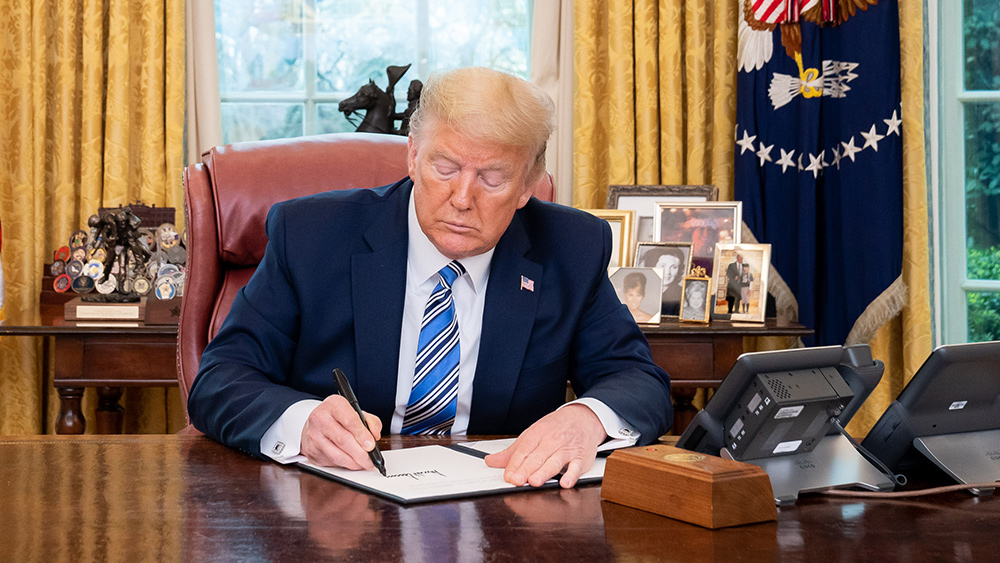RFK Jr. SAVES AMERICA from insane WHO dictatorship authority set to impose worldwide lockdowns anytime they announce a staged plandemic
07/20/2025 / By S.D. Wells

U.S. Health Secretary Robert F. Kennedy Jr. and Secretary of State Marco Rubio announced that the United States is officially rejecting recent amendments to the World Health Organization’s (WHO) International Health Regulations (IHR), which are set to take effect for other signatories on July 19. The Biden-era revisions would have granted the WHO sweeping new powers to enforce global public health mandates, including lockdowns, travel restrictions, and vaccine passport implementation—all without needing to declare a formal emergency.
- U.S. Formally Rejects WHO Health Regulation Amendments: Health Secretary Robert F. Kennedy Jr. and Secretary of State Marco Rubio announced the U.S. will not accept amendments to the WHO’s International Health Regulations (IHR), citing threats to national sovereignty and individual freedoms, including potential for lockdowns, vaccine passports, and censorship.
- Amendments Called a Pathway to Global Surveillance and Control: Kennedy and other critics said the IHR changes enable the WHO to impose health measures based on vague “potential public health risks,” paving the way for global surveillance systems and centralized digital medical databases without democratic oversight.
- Decision Framed as a Victory for Constitutional Rights: Supporters of the rejection, including leaders from the health freedom movement, hailed the move as a “defining moment in human history,” emphasizing it protects American autonomy and restores the primacy of the U.S. Constitution in health-related decision-making.
- U.S. Rejection Sparks Global Momentum: The U.S. is the second nation, after Israel, to reject the amendments, potentially encouraging other countries—such as Argentina—to follow suit. Experts say the rejection undermines the WHO’s authority and gives political cover to nations wary of ceding control to unelected global entities.
‘Defining moment in human history’’: U.S. rejects WHO’s International Health Regulation amendments
Kennedy said the amendments posed a serious threat to national sovereignty and democratic freedoms, criticizing them as a pathway toward a “global medical surveillance state.” He warned the changes used overly broad language and would allow the WHO to mandate global messaging, potentially leading to censorship and propaganda like that seen during the COVID-19 pandemic. In a video statement, he declared, “We will not sign over authority to an unelected international organization that could order any health measure it sees fit.”
Though the amendments had been watered down from earlier versions, critics said they still gave the WHO unprecedented powers with minimal accountability. The WHO could act on mere “potential” public health risks, bypassing the need for national consent. While the U.S. formally began withdrawing from the WHO earlier this year under a Trump executive order, these amendments would still have been binding under the IHR treaty, which the U.S. remains party to.
Experts and health freedom advocates hailed the decision. Sayer Ji, chair of the Global Wellness Forum, called it a “defining moment in human history” and a symbolic rejection of global technocratic control. Dr. Meryl Nass, founder of Door to Freedom, said the amendments clearly aimed to establish global governance under the guise of health policy. Public health scholar Dr. David Bell praised Kennedy’s stance as “rational,” especially in contrast to what he called the jargon-heavy justifications used by supporters of the amendments.
According to independent journalist James Roguski, the U.S. is the second country to reject the amendments, following Israel. Other countries, including Argentina, are reportedly considering similar moves ahead of the July 19 deadline. Notably, the WHO does not publicly announce which countries reject the amendments, leaving uncertainty about global opposition.
Critics also pointed to the WHO’s handling of COVID-19 as justification for limiting its powers. Kennedy said the organization failed to enforce its existing regulations when China withheld crucial information early in the pandemic. Despite this failure, the WHO faced no consequences. “We must strengthen national and local autonomy,” he said, “to restore a real balance of power underneath all the bureaucratic language.”
The rejected amendments are separate from the WHO’s newly passed “Pandemic Agreement,” which mandates member nations provide 20% of their vaccines and medical supplies to the WHO during future pandemics. That treaty must still be ratified by 60 countries and finalized with a pathogen-sharing annex.
In closing, Kennedy posed a crucial question: “Do we want a future where every movement, transaction, and human body is under surveillance in the name of public health—or do we want to reclaim our freedom and democratic institutions?” For now, the U.S. has chosen the latter.
Bookmark plague.info to your favorite independent websites for updates on TWO HUNDRED new gain-of-function viruses NIH, CDC and WHO plan to release into the “wild” while blaming infected bat soup eaters at the Wuhan wet market.
Sources for this article include:
X.com
Submit a correction >>
Tagged Under:
biased, Globalism, health freedom, IHR amendments, International health regulations, Marco Rubio, medical martial law, Medical Tyranny, obey, pandemic, pandemic agreement, Plandemic, reject who, Robert F. Kennedy Jr., scamdemic, WHO, who amendment, WHO corrupt, world health, World Health Organization
This article may contain statements that reflect the opinion of the author




















